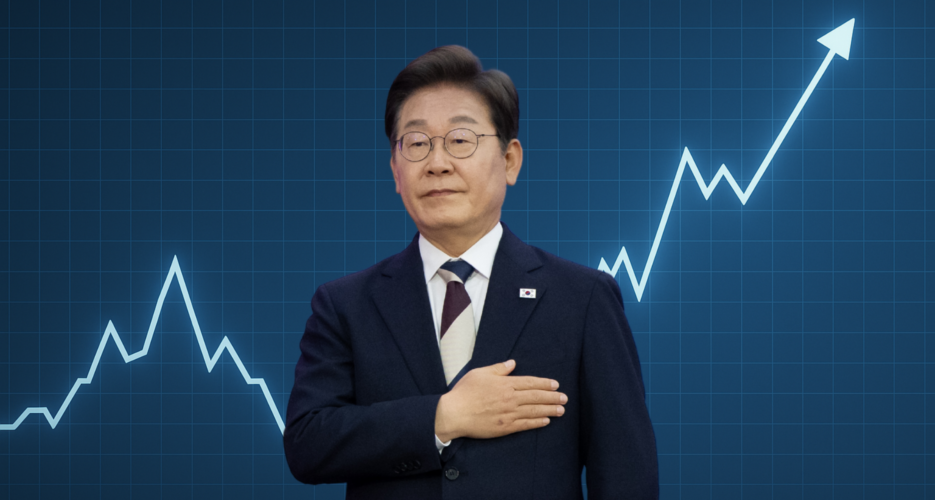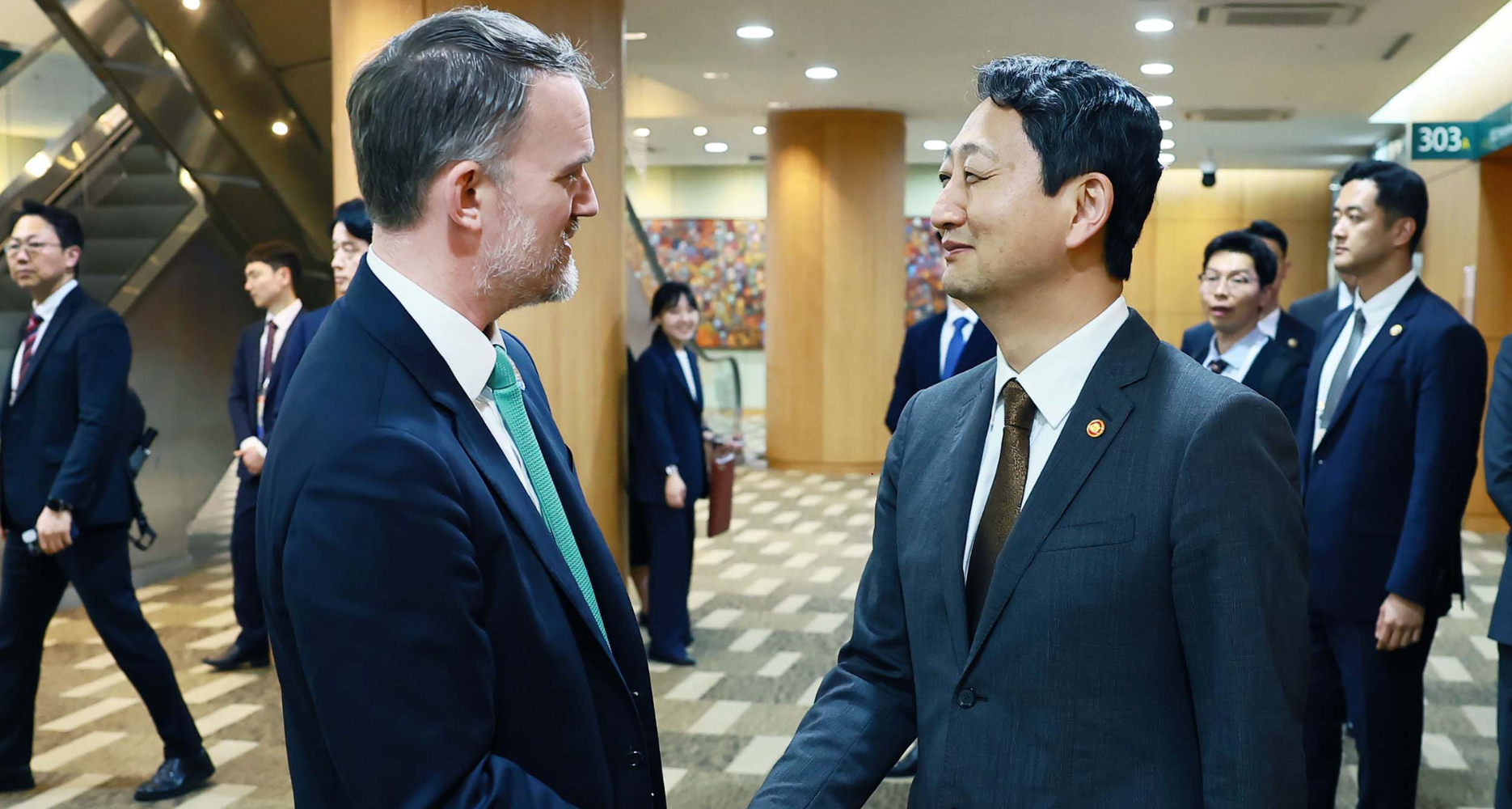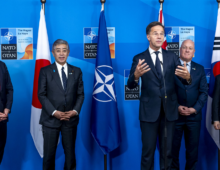|
Analysis US flags South Korea again in currency report over surplus and exchange policyThe designation comes amid weak growth, political transition and US skepticism over Seoul’s macroeconomic transparency John LeeJune 6, 2025  South Korean President Lee Jae-myung during his inaugural address in front of an economic chart, June 4, 2025 | Image: ROK Ministry of Culture, Sports and Tourism, edited by Korea Pro South Korea’s reinstatement on the U.S. Treasury Department’s currency monitoring list on Friday highlights a growing trust deficit between Washington and Seoul over financial transparency and macroeconomic management at a time when the ROK is grappling with slowing growth and political transition. While the designation carries no immediate legal consequences, it delivers a reputational blow with potential long-term costs for capital flows, investor confidence and Seoul’s global financial aspirations. REPEATED DESIGNATION SIGNALS CONCERN The Treasury Department’s semiannual foreign exchange report cited nine countries, including South Korea, for “close attention,” placing them on the Monitoring List due to significant trade surpluses or current account balances. For South Korea, the decision marks its second consecutive inclusion on the list since Nov. 2024, after a brief removal in late 2023. According to the report, the ROK met two of three conditions: a bilateral goods trade surplus with the U.S. exceeding $15 billion and a current account surplus above 3% of GDP. In 2024, South Korea recorded a trade surplus of $65.9 billion with the U.S. while its current account surplus reached 5.3%. Although the Treasury Department did not designate South Korea as a currency manipulator and acknowledged no evidence of sustained foreign exchange intervention, the political framing of the report reflects a broader shift in tone under the Trump administration. The report’s language emphasized combatting “unfair currency practices” that supposedly “hollowed out” U.S. manufacturing and pledged stronger countermeasures against countries seen as manipulating their currencies for competitive advantage.  U.S. President Donald Trump, Treasury Secretary Scott Bessent and Commerce Secretary Howard Lutnick at the Oval Office, April 10, 2025 | Image: White House THE WON IS NOT THE ISSUE South Korea’s foreign exchange (FX) activities — intervening to stabilize volatility — have been relatively transparent and restrained, and the government has consistently emphasized that any FX action is aimed at smoothing disorderly market movements, such as the won’s rapid depreciation last year, rather than pursuing competitiveness through depreciation. For instance, the Financial Services Commission stated late last year that the government was ready to activate a $7.3 billion (10 trillion won) stock market stabilization fund and a $29.5 billion (40 trillion won) bond market stabilization fund. However, that announcement followed immediately after former President Yoon Suk-yeol’s failed martial law declaration, which saw the won tumbling nearly 3% to a two-year low. South Korea’s currency volatility, particularly the won’s exchange rate against the U.S. dollar, can also be attributed to external factors beyond Seoul’s control. In May, Bank of Korea (BOK) Governor Rhee Chang-yong explained that the won’s volatility was expected to persist partly due to intensifying protectionist policies. Moreover, South Korea’s large current account surplus reflects persistent structural factors, including weak domestic consumption and robust semiconductor exports, both of which were partially exacerbated by U.S. tariff regimes. Thus, while the monitoring list designation may be technically correct according to the Treasury Department’s rigid definition, in practice, it is not entirely fair and may cause significant unearned reputational harm. MISALIGNED TIMING, MISALIGNED SIGNALS The designation also comes just two days after Lee Jae-myung was sworn in as South Korea’s 21st president following a snap election. Lee inherits an economy expected to grow just 0.8% this year, according to the BOK’s revised forecast. That downgrade reflects weakening domestic demand, rising external headwinds and policy uncertainty. Being placed under U.S. scrutiny creates an additional obstacle for Lee, who is attempting to restore growth and investor confidence. It risks constraining Seoul’s policy space at a moment when it needs more fiscal flexibility. Further, the designation complicates Lee’s efforts to project competence on the international stage, especially in the realm of economic governance.  Then-Democratic Party leader Lee Jae-myung during a stock market revitalization task force meeting at the Korea Exchange in Seoul, Nov. 28, 2024 | Image: Democratic Party of Korea REAL COSTS BEYOND LABELS While being on the monitoring list does not trigger automatic sanctions or penalties, it can shape how markets perceive South Korea’s regulatory risk. For global investors, the inclusion raises questions about the consistency of South Korea’s macroeconomic management and can affect assessments by rating agencies, institutional investors and counterpart regulators. Financial institutions may face heightened compliance checks on cross-border transactions involving South Korea, particularly in the U.S. and Europe. Multinational corporations could encounter delays or increased scrutiny in approvals for mergers, financing or listings. Additionally, South Korean sovereign bonds and outbound investments, especially by public funds like the National Pension Service, may be priced more cautiously in global markets. South Korea has long sought to position itself as a leader in digital finance, ESG regulation and rule-setting for emerging markets. But recurring designations fortifies the perception that Seoul is opaque rather than transparent in its macroeconomic policy posture. This credibility gap complicates South Korea’s ability to shape international financial norms or attract long-term capital, which could be particularly deleterious to Lee Jae-myung’s pledge to raise the country’s benchmark stock index, the KOSPI, to 5,000. ESCAPING THE MONITORING LOOP It is possible for South Korea to get itself removed from the Treasury Department’s currency monitoring list. Seoul was taken off the list in 2023 before being reinstated the following year. Technically, the Treasury Department requires countries to meet no more than one of the three thresholds for two consecutive reports to be taken off the monitoring list. That means Seoul could be removed again by mid-2026, at the earliest, if it meets the criteria. However, with U.S. President Donald Trump’s economic team committed to “America First” trade narratives, the Lee administration will likely have to strengthen bilateral economic policy dialogues with the U.S. One pathway is to deepen existing forums like the U.S.-ROK Senior Economic Dialogue, most recently held in Atlanta in Oct. 2024, which discussed investment security, non-market practices and digital policy coordination. Now that South Korea’s top leadership vacuum and uncertainty following Yoon’s impeachment and the revolving door of acting presidents over the past six months are over, the Lee administration could regularize these exchanges at the working level, particularly between South Korean finance ministry officials and their U.S. Treasury counterparts. These steps would signal that Seoul is not just complying with technical norms but is proactively engaging Washington and maintaining momentum behind other initiatives that align with Trump’s agenda, including non-tariff barriers and balanced trade.  U.S. Trade Representative Jamieson Greer meets with ROK industry minister Ahn Duk-geun, May 16, 2025 | Image: ROK Ministry of Trade, Industry and Energy STRATEGIC CONSEQUENCES AHEAD South Korea’s placement on the currency monitoring list is not likely to lead to immediate capital flight or rating downgrades. But over time, recurring designations erode Seoul’s status as a trusted financial partner, creating friction in trade negotiations, regulatory cooperation and investment diplomacy. While Lee Jae-myung has already pledged to pursue domestic economic reforms, he will have to pair those reforms with clear communication with Washington to maximize his fiscal flexibility. Unless his administration proves it can be trusted on transparency and financial governance, markets will continue to view it with suspicion. Edited by Alannah Hill South Korea’s reinstatement on the U.S. Treasury Department’s currency monitoring list on Friday highlights a growing trust deficit between Washington and Seoul over financial transparency and macroeconomic management at a time when the ROK is grappling with slowing growth and political transition. While the designation carries no immediate legal consequences, it delivers a reputational blow with potential long-term costs for capital flows, investor confidence and Seoul’s global financial aspirations. Get your
|
|
Analysis US flags South Korea again in currency report over surplus and exchange policyThe designation comes amid weak growth, political transition and US skepticism over Seoul’s macroeconomic transparency  South Korea’s reinstatement on the U.S. Treasury Department’s currency monitoring list on Friday highlights a growing trust deficit between Washington and Seoul over financial transparency and macroeconomic management at a time when the ROK is grappling with slowing growth and political transition. While the designation carries no immediate legal consequences, it delivers a reputational blow with potential long-term costs for capital flows, investor confidence and Seoul’s global financial aspirations. © Korea Risk Group. All rights reserved. |











